
Leopold II was the second King of the Belgians from 1865 to 1909 and the self-made autocratic ruler of the Congo Free State from 1885 to 1908.

The Belgian Congo was a Belgian colony in Central Africa from 1908 until independence in 1960. The former colony adopted its present name, the Democratic Republic of the Congo (DRC), in 1964.

The Congo Free State, also known as the Independent State of the Congo, was a large state and absolute monarchy in Central Africa from 1885 to 1908. It was privately owned by and in a personal union with Leopold II of Belgium; it was not a part of, nor did it belong to, the Kingdom of Belgium, of which he was the constitutional monarch. Leopold was able to seize the region by convincing other European states at the Berlin Conference on Africa that he was involved in humanitarian and philanthropic work and would not tax trade. Via the International Association of the Congo, he was able to lay claim to most of the Congo Basin. On 29 May 1885, after the closure of the Berlin Conference, the king announced that he planned to name his possessions "the Congo Free State", an appellation which was not yet used at the Berlin Conference and which officially replaced "International Association of the Congo" on 1 August 1885. The Congo Free State operated as a separate nation from Belgium, in a personal union with its King, privately controlled by Leopold II, although he never personally visited the state.

The Berlin Conference of 1884–1885, also known as the Congo Conference or West Africa Conference, regulated European colonisation and trade in Africa during the New Imperialism period and coincided with Germany's sudden emergence as an imperial power. The conference was organized by Otto von Bismarck, the first chancellor of Germany. Its outcome, the General Act of the Berlin Conference, can be seen as the formalisation of the Scramble for Africa, but some scholars of history warn against an overemphasis of its role in the colonial partitioning of Africa and draw attention to bilateral agreements concluded before and after the conference. The conference contributed to ushering in a period of heightened colonial activity by European powers, which eliminated or overrode most existing forms of African autonomy and self-governance. Of the fourteen countries being represented, six of them – Austria-Hungary, Russia, Denmark, the Netherlands, Sweden–Norway, and the United States – came home without any formal possessions in Africa.
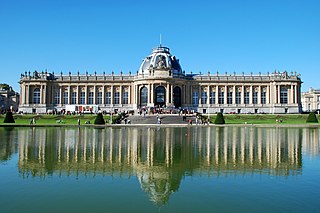
The Royal Museum for Central Africa or RMCA, also officially known as the AfricaMuseum, is an ethnography and natural history museum situated in Tervuren in Flemish Brabant, Belgium, just outside Brussels. It was built to showcase King Leopold II's Congo Free State in the International Exposition of 1897.

Emile Vandervelde was a Belgian socialist politician. Nicknamed "the boss", Vandervelde was a leading figure in the Belgian Labour Party (POB–BWP) and in international socialism.
The Brussels Conference Act of 1890 was a collection of anti-slavery measures signed in Brussels on 2 July 1890 to, as the act itself puts it, "put an end to Negro Slave Trade by land as well as by sea, and to improve the moral and material conditions of existence of the native races".

The International Association of the Congo, also known as the International Congo Society, was an association founded on 17 November 1879 by Leopold II of Belgium to further his interests in the Congo. It replaced the Belgian Comité d'Études du Haut-Congo, which was part of the International African Association front organisation created for the exploitation of the Congo. The goals of the International Congo Society was to establish control of the Congo Basin and to exploit its economic resources. The Berlin Conference recognised the society as sovereign over the territories it controlled and on August 1, 1885, i.e. four and half months after the closure of the Berlin Conference, King Leopold's Vice-Administrator General in the Congo, announced that the society and the territories it occupied were henceforth called "the Congo Free State".
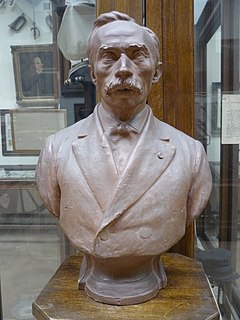
Émile Theodore Joseph Hubert Banning was a doctor of philosophy and literature and a Belgian senior civil servant who played an important role in the Belgian politics of the 19th century.

The United States and Belgium maintain a friendly bilateral relationship. Continuing to celebrate cooperative U.S. and Belgian relations, 2007 marked the 175th anniversary of the nations' relationship.
The Royal Academy for Overseas Sciences or RAOS is a Belgian federal academy that contributes to the progress of scientific knowledge about overseas regions. It is located in Uccle, Brussels and is one of Belgium's numerous academies.
Korongo Airlines sprl was an airline from the Democratic Republic of the Congo, headquartered in Lubumbashi. It was founded on behalf of Brussels Airlines and other Belgian investors in 2009, and operated scheduled regional flights from its base at Lubumbashi International Airport.
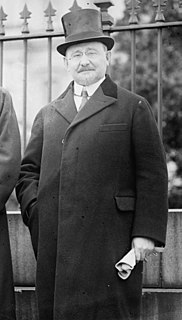
Félicien Cattier (1869–1946) was a very prominent Belgian banker, financier and philanthropist. He was also professor of law at the Free University of Brussels. He was governor of the powerful trust, the Société Générale de Belgique and chairman of the Union minière du-Haut-Katanga amongst many other companies.
This is a survey of the postage stamps and postal history of the Democratic Republic of the Congo, formerly Zaire and the Belgian Congo.

The International African Association was a front organization established by the guests at the Brussels Geographic Conference of 1876, an event hosted by King Leopold II of Belgium. The Association was used by King Leopold ostensibly to further his purportedly altruistic and humanitarian projects in the area of Central Africa, the area that was to become Leopold's privately controlled Congo Free State. King Leopold volunteered space in Brussels for the International African Association's headquarters, and there were to be national committees of the association set up in all the participating countries, as well as an international committee. Leopold was elected by acclamation as the international committee's first chairman, but said that he would serve for one year only so that the chairmanship could rotate among people from different countries.
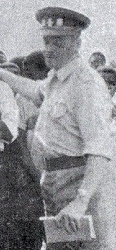
Émile Robert Alphonse Hippolyte Janssens was a Belgian military officer and colonial official, best known for his command of the Force Publique at the start of the Congo Crisis. He described himself as the "Little Maniac" and was a staunch disciplinarian, but his refusal to see Congolese independence as marking a change in the nature of his command has been cited as the immediate cause of the mutiny by the Force Publique in July 1960 that plunged Congo-Léopoldville into chaos and anarchy.

Émile Pierre Joseph Storms was a Belgian soldier, explorer, and official for the Congo Free State. He is known for his work between 1882 and 1885 in establishing a European presence in the regions around Lake Tanganyika, during which he supported the White Fathers missionaries and attempted to suppress the East African slave trade. He is remembered for his ruthless fight against slavery and the capture and subsequent execution of the slave trader Lusinga.
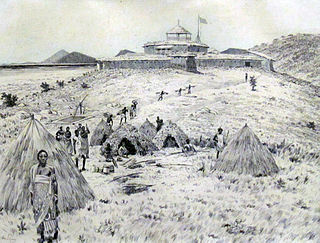
Karema is a settlement in Tanzania, on the east shore of Lake Tanganyika, once the location of a White Fathers mission station.

The Léopoldville riots were an outbreak of civil disorder in Léopoldville in the Belgian Congo which took place in January 1959 and which were an important moment for the Congolese independence movement. The rioting occurred when members of the Alliance des Bakongo (ABAKO) political party were not allowed to assemble for a protest and colonial authorities reacted harshly. The exact death toll is not known, but at least 49 people were killed and total casualties may have been as high as 500. Following these riots, a round table conference was organized in Brussels to negotiate the terms of Congo's independence, The Congo received its independence on 30 June 1960, becoming the Republic of the Congo.

Les Belges dans l'Afrique Centrale. Voyages, aventures et découvertes d'après les documents et journaux d'explorateurs is a travel account composed of three volumes about the early years of the colonization of the Congo basin by Léopold II, which was published several times as both books and instalments between 1884 and 1893. The first volume was written by Adolphe Burdo (1849-1891) and subtitled De Zanzibar au Lac Tanganika. The second and third were written by Charles de Martrin-Donos (1857-1904) and subtitled Le Congo et ses affluents. The volumes were written to "popularize and glorify the civilizing African enterprise, and the Belgians who took part in it".












